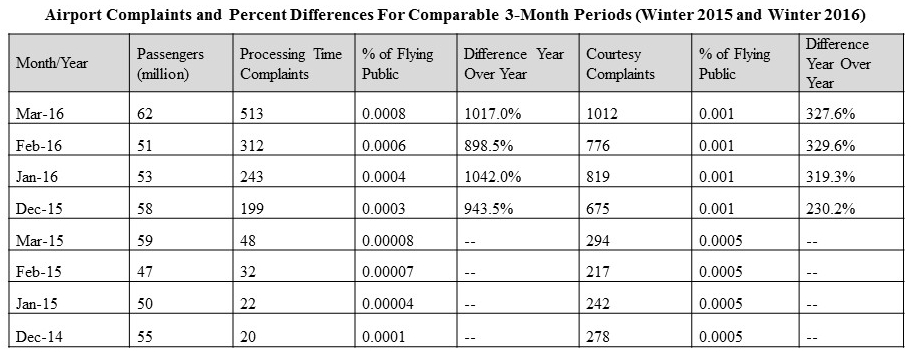Looking at Transportation Security Administration (TSA) data available to date, customer service complaints against the agency do not seem to be abating. In a recent post, I compared TSA processing time complaints and courtesy complaints over two 3-month periods. The results showed that in some cases, the differences in the complaint rates year-over-year were more than 1,000%.
Recently, however, there have been a number of news articles showing that long lines at our nation’s airports have been increasing. Is this having an impact on complaints year-over-year?
Yup.
TSA has screened more passengers than in the previous comparable time periods, but the number of complaints has increased proportionately more. For example, in March 2016, TSA screened about 62 million passengers. But the table below also shows that compared to March 2015, processing time complaints increased more than 1,000%. For courtesy complaints, the difference year-over-year was more than 300%.
The issue associated with longer lines and consequently processing time complaints and courtesy complaints is four-fold.
- The time associated with people waiting in line is a wasted resource. Instead of waiting in line, travelers could be doing more productive activities. The Federal Aviation Administration values the time associated with people waiting on a plane to be $42.10 per hour.
- From a security perspective, those waiting in line become a soft target for terrorists. There no longer is a need, from a terrorist’s perspective, to get to the airplane when similar damage can be inflicted on those waiting in line.
- Unhappy travelers tend to spend less in the airport on average than happy travelers. This ultimately results in a loss of airport jobs.
- When the lines become too long, people begin choosing alternative, potentially more dangerous modes of travel, such as driving. It has been demonstrated that the statistical risk of flying and becoming a fatality is less than that of driving the same distance. Thus, at a high level, when long lines encourage people to drive rather than fly, the long lines are a catalyst for accidents and fatalities.
Long wait times are not just about inconvenience or frustration. They have real monetary, security and safety consequences.



